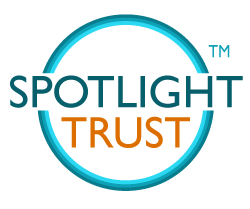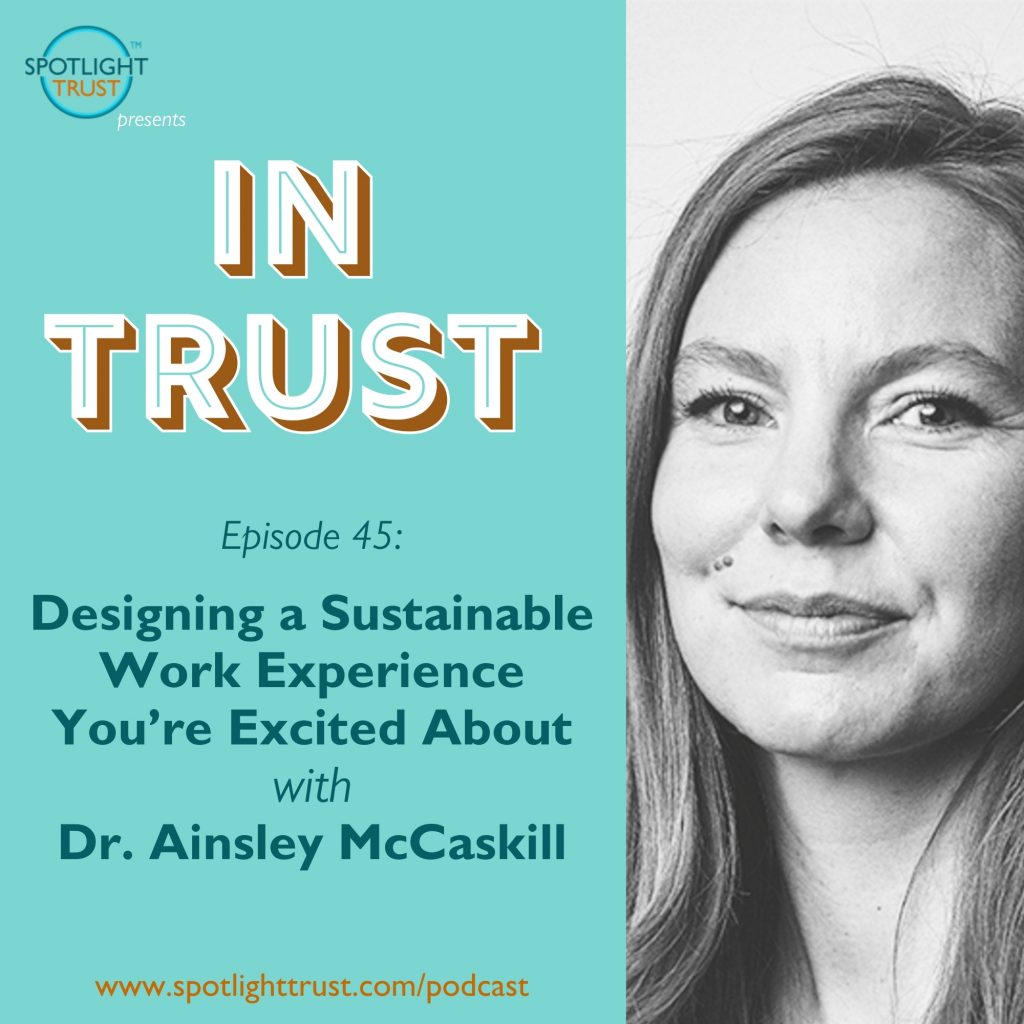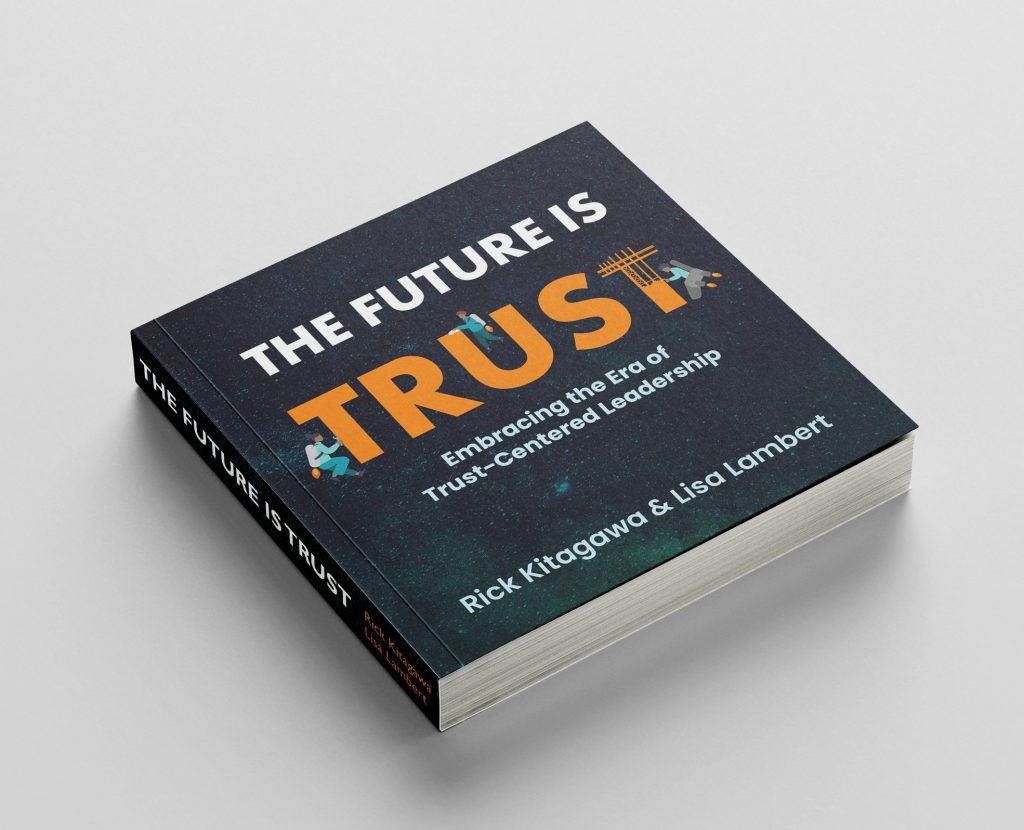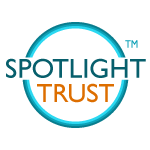What’s the root of burnout and why might burnout not be a helpful term? How does building self-trust help you design genuinely satisfying work experiences where you can sustainably show up as your best self without burning out?
We dove into these questions and many more with Dr. Ainsley McCaskill, a family physician, hospitalist, and certified coach. Ainsley brings strategy, innovation, and design tools to the way physicians live and practice medicine, helping them challenge the status quo and create sustainable and impactful work experiences that they’re excited about.
While Ainsley’s work focuses on physicians, we think much of it applies to high-performers more broadly and those who identify as Type A.
If you’re wanting to work at your absolute best and support others in doing so too without burning out, you’ll want to give this episode of In Trust a listen.
Overview of Episode 45: Designing a Sustainable Work Experience You’re Excited About with Dr. Ainsley McCaskill
Talking Points
- What led Ainsley to realize there had to be a more sustainable way to approach living practicing medicine
- The backstory behind radical sandwiches
- Looking at physician burnout as a system problem
- Why conforming is not sustainable
- Making time for a radical sandwich and how that can transform your day
- A more helpful lens to burnout
- How our expectations for how work should feel are quite low
- Why Ainsley’s sick of talking about burnout
- How Ainsley’s choice to prioritize ease has been a gamechanger for her
- Why Ainsley thinks a lot about wellness-centered decision-making
- The problem with busy and a common trap of high-performance cultures
- How Ainsley builds the trust to have meaningful conversations with physicians that are counterculture
- So what, as in, “So and therefore what?”
- Trusting yourself in the face of systemic pressures that push you towards conformity
- Letting go of narratives like “career suicide” that may not be helpful
- The root of self-trust
- How low stakes practices and iterating forward open up your sense of possibility and build awareness of feeling resistance to change
- How lightness and play can accelerate your sense of self-trust
Quotables
“I think physician burnout is a system problem. But systems don’t change spontaneously, so I think that the solutions to burnout—or bypassing burnout all together in your career—are actually individual. So that comes back to that idea that conforming is not a long term solution. It’s not sustainable to conform.” – Dr. Ainsley McCaskill
“Radical sandwiches is about looking for your alternatives and what you need in your day for you to have a day where you are doing your best work and getting what you need. So the radical sandwich is that radical act of actually making time for lunch in your work day, which is totally incomprehensible for a lot of people.” – Dr. Ainsley McCaskill
“There’s a really strong culture of dismissing your own needs in service of showing up the way that you’re being asked to show up by the system, but in doing so we miss out on all the opportunities that we actually have to design our day.” – Dr. Ainsley McCaskill
“The systems we work within continue as they are in life unless there’s a stimulus to change.” – Dr. Ainsley McCaskill
“I think our expectations for how work should feel are quite low.” – Dr. Ainsley McCaskill
“Here’s why I’m sick of talking about burnout: it doesn’t mean anything to people. If you ask someone if they’re burned out, they basically have to be in flames to consider that possibility. We don’t think about paying attention to that feeling we have where we’re like, ‘Wow. Okay, I’ve had enough today. I’m feeling a little low reserve. I’m having trouble empathizing. I’m feeling a little dissociated.’ That stuff doesn’t pop up as red flags for us. We just normalize it as a pretty common thing to run into. So what’s a better lens? I think we need to take how we feel at work and how we feel about our work more seriously and trust that it’s possible to really enjoy our work to leave our workday feeling satisfied.” – Dr. Ainsley McCaskill
“I think a lot about wellness-centered decision-making. How does this choice impact my wellness? Is this in support of my wellbeing? Is this in support of the contribution I want to make, how I want to show up in this space, the impact that I want to have, what I want to model for other people? I really think that a form of leadership is making choices that are based on your values, and in turn, giving permission to other people to do the same.” – Dr. Ainsley McCaskill
“So how do we build the trust to have these conversations? I think it’s about sharing our own experiences. And one of the really beautiful things about doing it in community is the permission that people experience to individualize because the solutions for all of us are different. It’s incredible because it really frees people up to innovate.” – Dr. Ainsley McCaskill
“Needs are design cues.” – Dr. Ainsley McCaskill
“Self-trust comes from curiosity about the stories we’re telling ourselves. Self-trust comes from experimentation.” – Dr. Ainsley McCaskill
“If I really think about the root of where self-trust comes from, I think it’s from extrapolating from successes I’ve had elsewhere in my life, not even necessarily professional ones.” – Dr. Ainsley McCaskill
“Low stakes practices really open up your sense of possibility.” – Dr. Ainsley McCaskill
Show Notes
- Ainsley’s website
- Ainsley’s Instagram @radicalsandwiches
- Ainsley’s Canadian Family Physician article How to practise medicine, well
This episode sponsored by:
The Future Is Trust
Embracing the Era of Trust-Centered Leadership
There’s a lot of uncertainty about the future, but one thing we are sure about is that The Future Is Trust. Which also happens to be the title of our new book that’s available now: The Future is Trust: Embracing the Era of Trust-Centered Leadership.
We are so excited to bring this reimagination of what a leadership book can be. The book sheds light on:
- Why Trust: Why now, what’s changed, and what do we have without trust?
- What is Trust: The act of trusting–how it inspires belonging, resilience, and collaboration.
- How to Build Trust: Starting with ourselves, the foundational tools to wire all of our connections for trust.
Visit out thefutureistrust.com to order your copy and access special bonuses.








The Trust To Make Mistakes And Own Up To Them Spotlight Trust™ | The future is trust.
[…] In Trust podcast episode: Designing a Sustainable Work Experience You’re Excited About – Interview with Dr. Ainsley Mc… […]